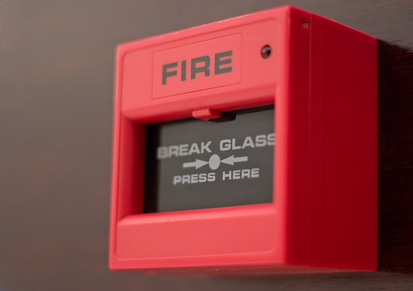TEL: 02392 382386
Fire Alarm Systems
 Fire Alarm and Detection Systems.
Fire Alarm and Detection Systems.
“Do you need one?”
The Regulatory Reform (Fire Safety) Order 2005 introduces significant change. As well as simplifying current legislation, it introduces the need for employers, building owners and occupiers to have a greater understanding of fire safety and nominate a “responsible person” to ensure compliance.
Section 13-1a Fire-fighting and fire detection requires that:
(a) The premises are, to the extent that it is appropriate, equipped with appropriate fire-fighting equipment and with fire detectors and alarms. The Government guides going to a little more detail recommending that the Fire Alarm & Detection systems should comply with BS5839.
As a basic guide, all but the simplest, small, single storey, open plan premises with minimal risks, require some form of electronic fire alarm and detection system..
British Standard 5839 sets out very clear guidance on every aspect of a fire alarm and detection system and is normally split into four distinct categories, Design, Installation, Commissioning and maintenance.
Fire Alarm and Detection Systems Design
One of the most critical parts of any fire alarm installation is the design stage. If this is not carried out correctly you could have as a minimum a system that does not comply with the British Standards maybe giving out false alarms and at worse a potentially life threatening system that does not detect correctly or not at all.
System Installation
The installation of your fire alarm system must not only comply with BS5839 but also the 17th Edition Wiring Regulations BS7671. The onus is on the responsible person to ensure your contractors or Installers are competent in both aspects of installation. Installation engineer must ensure the alarm system is fitted in accordance with the plans/ design specification.
Commissioning
The final step of the fire alarm and detection system installation, Commissioning is possibly the most important step in the installation of the fire alarm system; this is because they are the person who checks the whole system and sign’s it as safe and fit for purpose.
First they check it is fitted as per the design specifications and the as-fitted drawings and that the system complies with BS5839 and wiring is to the wiring regulations and safe to use.
Once they are satisfied the system is as it should be the commissioner will then test every device, detector and sounder etc on the system including checking the system performs as it should in various fault scenarios.
If the commissioner is not happy with the system he will give a list of works to be done before a re-test and will not pass it or certificate it.
Maintenance
All fire alarm and detection systems should be maintained by a competent person or company, in the Government guide books on the Regulatory Reform (Fire Safety) Order 2005, It strongly recommends that your fire alarm should be maintained to BS5839-1 or 6 and that it should be maintained as a minimum of every Six months more frequently if your site is classes as a high risk building or you have the possibility of vandalism etc of your fire system.
Competency and Training
All fire alarm engineers must be Competent in the field of work they carry out, the British Standards states:
3.11
Competent person
Person with the necessary training and experience, and with access to the requisite tools, equipment and Information, and capable of carrying out a defined task
